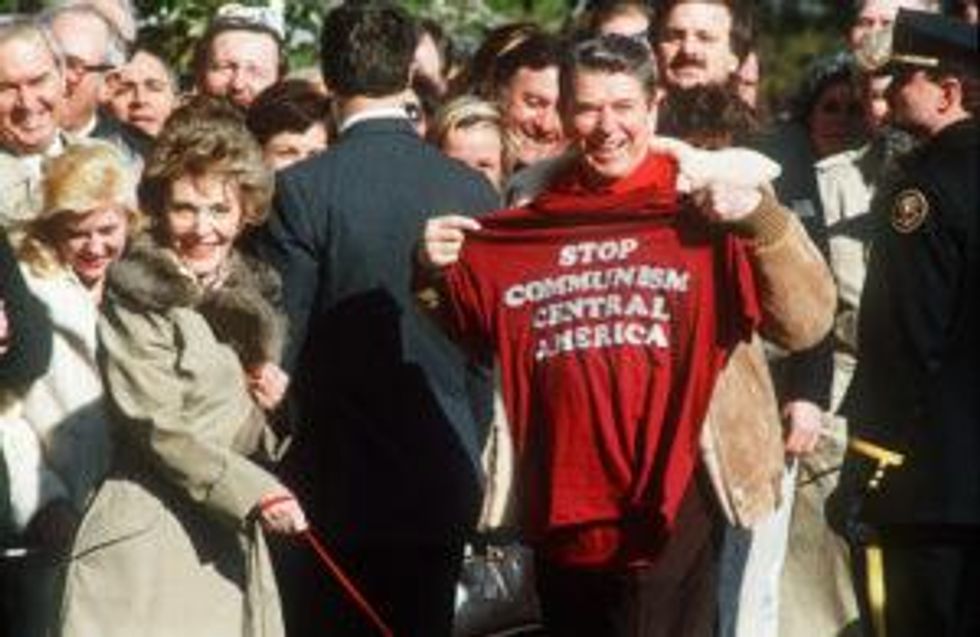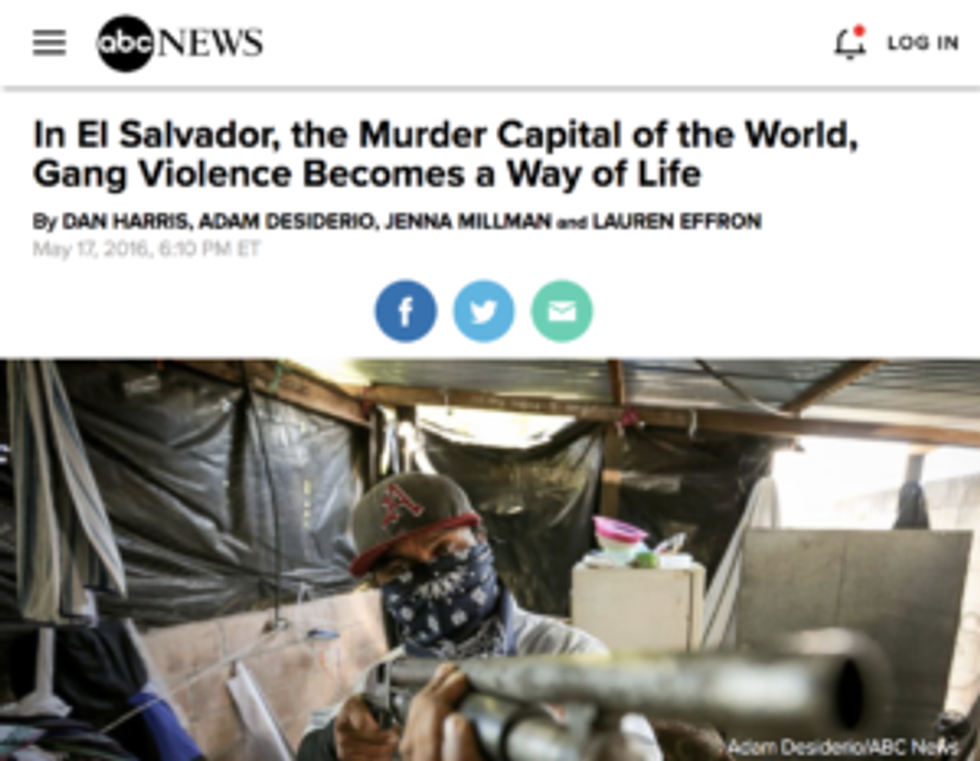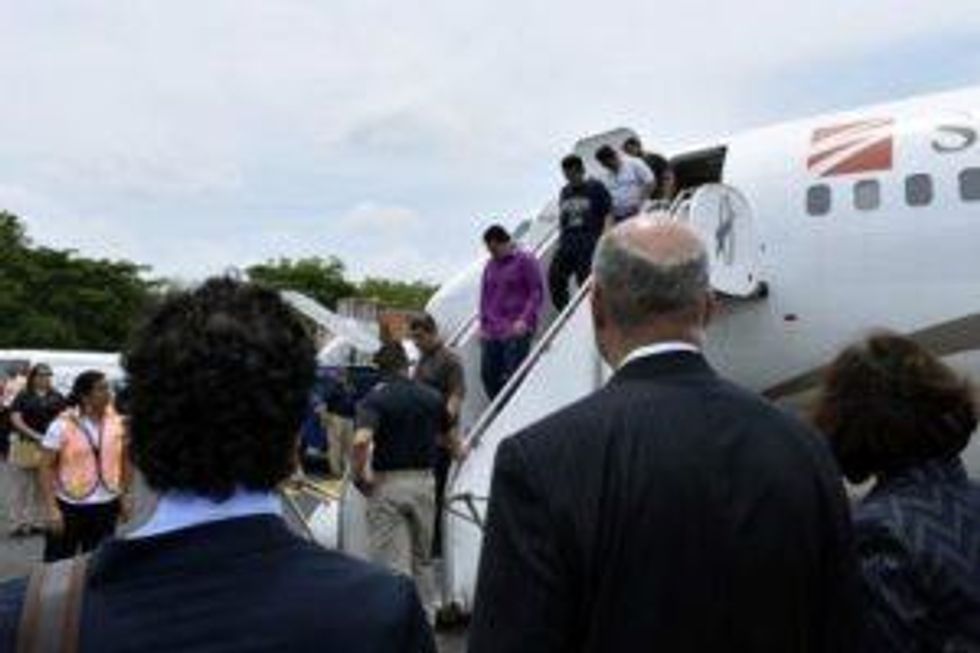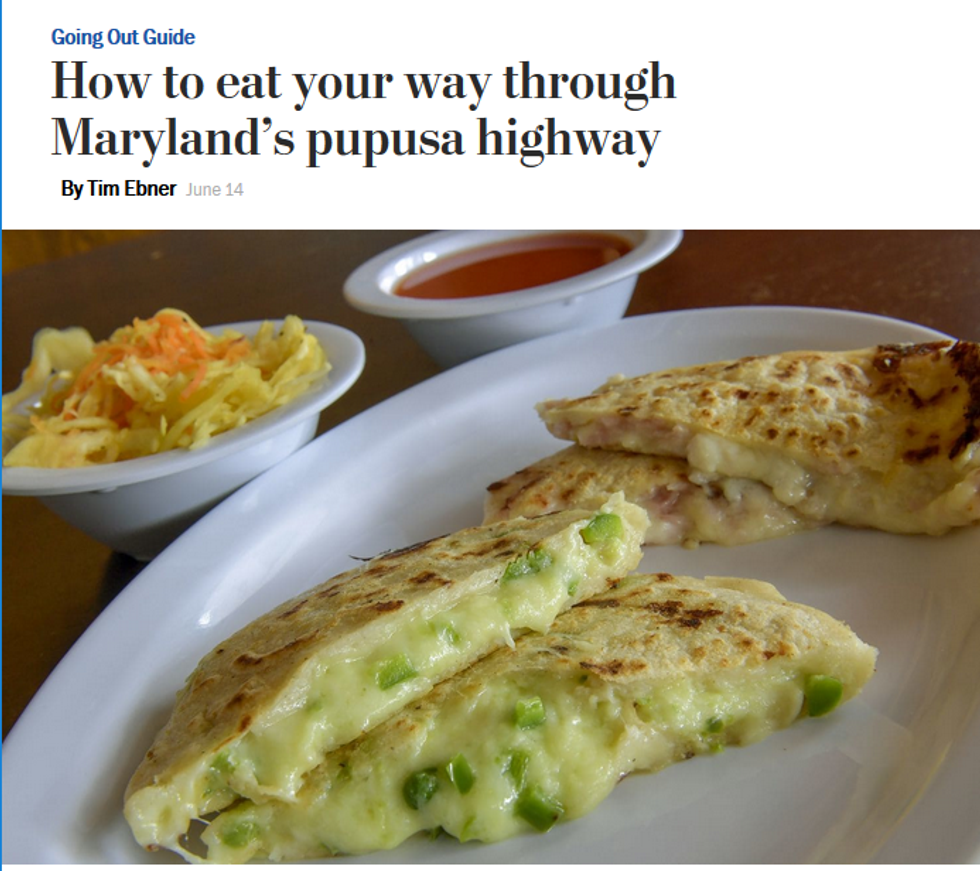In a piece for the Atlantic (6/20/18), former George W. Bush speechwriter David Frum countered statements by MSNBC's Chris Hayes, in which Hayes described a harrowing first-person account of a mother forcibly separated from her child at the US/Mexico border as reading like "the literature of a totalitarian government":
As Hayes elaborates his horror at the separation of mother from child, he seems to arrive at a conclusion that there is something inherently oppressive about any kind of immigration rule at all....The border crosser goes to them. She is not just "living her life ... and then all of a sudden, the state can come in and wrench your life apart." She, of her own volition, traveled hundreds of miles to challenge the authority of a foreign state to police its frontiers. When her challenge failed--when she was apprehended and detained--what happened next must have felt harsh and frightening. But dictatorial? Totalitarian? In democracies, too, the wrong side of the law is an inescapably uncomfortable place to find yourself.
Frum's argument presents the US as unimplicated in the surge in Central American migration except as its victim, a "sovereign state" that must "police its frontiers." His concluding worry about "the surges that will soon follow from the rest of the planet if the present surge is not checked" suggests he's given little thought to the particular forces driving people from that region, much less how those relate to US foreign and economic policy.
Why those countries?
The immigrants that Frum is speaking of come largely from the Central American countries of El Salvador, Honduras and Guatemala, an area known as the Northern Triangle. According to the Pew Research Center, there are 3 million total immigrants from these countries in the US, and about half of those immigrants are undocumented. While Mexican immigration has been falling in recent years, Central American immigration has increased: from 2007 through 2015, the total number of Northern Triangle immigrants rose by 25 percent.
Yet much media coverage of immigration misses out on why large numbers of people from the Northern Triangle are migrating to the US in the first place.
Over the past three generations, the Northern Triangle countries, long marked by profound levels of inequality, have each experienced horribly destructive civil wars and military coups. Unsurprisingly, the United States has been intimately involved in each of these, supporting anti-Communist regimes during the Cold War and protecting US business interests with truly disastrous results.
In 1954, the CIA orchestrated a coup to remove President Jacobo Arbenz, the democratically elected leader of Guatemala, at the behest of United Fruit Company (now Chiquita), the country's largest landowner. During the subsequent civil war that lasted until 1996, the US gave military and financial support to a succession of right-wing governments that committed large-scale human rights abuses that killed hundreds of thousands.
In Honduras in the 1980s, the CIA trained right-wing death squads like Battalion 316 that tortured and assassinated the government's left-wing political opponents. In 2009, the US State Department under Hillary Clinton supported the overthrow of Honduran President Manuel Zelaya by graduates of the School of the Americas, a notorious US military training academy. The coup created waves of protests and escalated murders of hundreds of activists, including indigenous leader Berta Caceres.

In El Salvador, when a military coup in 1979 sparked the formation of a leftist guerilla movement known as the Farabundo Marti National Liberation Front (FMLN), first the Carter and then the Reagan administration backed the anti-Communist junta in the ensuing civil war by supplying training, military equipment, arms and financial support totalling $6 billion. Much of the aid and arms ended up supporting the junta's paramilitary death squads. In 1980, these death squads assassinated Catholic Archbishop Oscar Romero during a sermon, and later that year raped and murdered four American nuns. In 1981, junta forces massacred over a thousand people, mostly women, children and the elderly, in the village of El Mozote. The perpetrators, the Atlacatl Battalion, had recently completed training with the U.S. military at Fort Bragg prior to the massacre. The CIA also funded presidential candidate and junta leader Napoleon Duarte prior to his election in 1984 in order to throw a wrench in peace talks, a move that dragged the war on for another eight years.
The Salvadoran civil war, which ultimately ended along with the Cold War in 1992, is estimated to have claimed the lives of up to 75,000 Salvadorans, including over 50,000 civilians, with 85 percent of deaths at the hands of the Salvadoran government and its paramilitary allies. Top US officials like Secretary of State Alexander Haig, Assistant Secretary of State Elliott Abrams and UN Ambassador Jeane Kirkpatrick each denied or obscured the human rights abuses and massacres in El Salvador order to maintain congressional funding for the Salvadoran military junta and other anti-Communist authoritarian regimes throughout Central America. Abrams later called the Reagan administration's record in El Salvador "one of fabulous achievement."
MS-13 a Policy Backfire
El Salvador provides perhaps the most striking case of how US responsibility is obscured in the current immigration debate, based on the notoriety of Mara Salvatrucha, a predominantly Salvadoran street gang better known as MS-13.
MS-13 has become a major scapegoat for Donald Trump and right-wing media in rationalizing harsh immigration policies. The Trump administration has referred to MS-13 gang members as "animals" who "infest" the United States--rhetoric that, as the Washington Post's Greg Sargent (5/25/18) noted, "slaps the dehumanizing slur on the least sympathetic subgroup and then conflates that subgroup with the larger group that is the real target."
This scapegoating seems to have worked: According to a recent HuffPost/YouGov survey, over 85 percent of Trump voters believe that MS-13 is a major threat to the United States as a whole. This level of anxiety seems misplaced, considering that even the Justice Department claims MS-13 has only about 10,000 members in the US.

For Salvadorans, though, the fear is very real: In 2017, El Salvador had the most murders per capita on the entire planet (109 per 100,000), followed by Honduras (64 per 100,000), with Guatemala coming in at number nine (31 per 100,000). And with stories like "In El Salvador, the Murder Capital of the World, Gang Violence Becomes a Way of Life" (ABC News, 5/17/16) and "Organised Violence Is Ravaging Central America and Displacing Thousands" (Guardian,6/29/17), media have used that violence to fan fears of MS-13 making inroads into US cities and suburbs.
But what Trump's racist rhetoric and fearmongering media alike ignore is that MS-13 is partially a product of US policy. The gang was actually founded in the Pico Union neighborhood of Los Angeles in the early 1980s, by Salvadoran immigrants and refugees from its civil war. Its subsequent growth from a small street gang in the US to a transnational criminal organization based out of the Northern Triangle provides an illuminating case study of how US foreign policy choices can backfire spectacularly.
Deportation's Boomerang Effect
The violence of the Salvadoran civil war sparked a mass exodus of Salvadorans to the United States. In 1970, there were only 15,717 Salvadoran born immigrants living in the US. By 1980, there were 94,447 Salvadoran-born immigrants in the US, shooting up to 465,433 by 1990. Undocumented Salvadorans were granted Temporary Protected Status from 1990 through 1994; TPS was extended following a catastrophic earthquake in 2001, and has been periodically renewed since. However, the Trump administration recently revoked TPS for El Salvador, effective September 2019.
During and after the civil war, a majority of Salvadoran-born immigrants ended up in Southern California, particularly in ethnically segregated neighborhoods in Los Angeles, which was at the time in the midst of violence gang turf wars stemming from the crack cocaine epidemic--itself partially the product of plummeting cocaine prices as the result of drug-smuggling by the CIA-backed Nicaraguan Contra rebels. In this atmosphere, young, impoverished Salvadoran immigrants formed small street gangs like MS-13 and the Eighteenth Street Gang (also known as Barrio 18) for protection from local African-American and Mexican gangs.

Following the end of the civil war in the '90s and continued gang violence in Southern California and the Washington, DC, metro area--the other major destination for Salvadoran immigrants--the Clinton administration engaged in a policy of mass deportation of immigrants with criminal records, beginning with the 1996 Illegal Immigration Reform and Immigrant Responsibility Act. This was a continuation of policies of the Reagan administration, who deported thousands of Salvadorans seeking asylum from the civil war. An estimate by the UN Office on Drugs and Crime counted almost 46,000 deportations of immigrants with criminal records (undocumented or not) to El Salvador from the US between 1998 and 2005.
El Salvador, just off its decade-plus-long civil war, was hardly equipped with the institutions necessary to deal with a massive influx of gang members from the United States. Gangs like MS-13 quickly integrated with already established street gangs within the country, bringing back elements of US gang culture such as symbols, identities and norms like tattoos or graffiti that helped bring local gang sets under the MS-13 umbrella.
The response of the Salvadoran government (and other Northern Triangle countries) was to crack down and lock up large numbers of suspected gang members in the early 2000s, a policy known as mano dura, or "firm hand." Over 30,000 arrests were made under the policy in El Salvador, although many cases were thrown out due to illegal arrests and lack of evidence. Despite this, the arrests concentrated large numbers of gang members in one place: Jails and prisons served as effective locations for centralizing the organization of gangs that were previously only loosely affiliated.
While these newly integrated gangs in El Salvador are still less centralized than Mexican drug cartels, the mano dura policies nonetheless allowed gangs to better coordinate across varied gang sets, and expand extortion rackets to tax neighbors and businesses on their turf, using threats of violence. These extortion rackets, along with continued violence between gangs over turf, have created an atmosphere of fear that Salvadoran families quite reasonably want to get away from.
Pouring Fuel on the Fire
Increased deportations of Salvadoran gang members during the Trump administration will likely have the effect of further swelling gang membership numbers in El Salvador, which will in turn lead to more migration as Salvadorans flee gang extortion rackets and violence. Even police have reservations about the harsh immigration policies, and MS-13 gang members have acknowledged that deportation policies help expand their numbers.
Continued gang crackdowns by the Salvadoran government over the past few years are also an issue that the US has a hand in: Salvadoran security forces accused by the UN of extrajudicial killings of gang members have received millions in US aid and training from the FBI and DEA. Ongoing violent confrontations between Salvadoran law enforcement and gangs also contribute to a climate of fear and resentment among Salvadorans as well. Just as tough-on-crime policies have generally failed to reduce crime in the US, in El Salvador and the other Northern Triangle countries they have just as bad a track record, as shown by the failure of the mano dura policies.
The end of Temporary Protected Status for over 200,000 Salvadorans, and their likely subsequent deportation, will also have a major effect on the Salvadoran economy by decreasing remittances from the United States, which account for over about a sixth of the country's GDP. The end of TPS, combined with high levels of unemployment and underemployment that are partially attributable to US neoliberal economic policies like the 2006 Central American Free Trade Agreement (CAFTA), will likely increase the poverty that feeds youth gang membership and immigration. As Mark Tseng-Putterman noted in Medium (6/20/18), "There are few connections being drawn between the weakening of Central American rural agricultural economies at the hands of CAFTA and the rise in migration from the region in the years since." Indeed, the destructive impact of US trade policy in Latin America over the years has been actively obscured by the devotion of corporate media to "free trade" nostrums. As New York Times columnist Thomas Friedman explained when he endorsed CAFTA in a 2006 CNBC interview: "I didn't even know what was in it. I just knew two words: free trade."
While the United States does not necessarily deserve 100 percent of the blame for the conflicts and economic policies that have led to increases in Northern Triangle violence or immigration, it is certainly a major culprit, and has poured fuel on the fire every time it has had the opportunity to do otherwise.
Ignoring the Context

Yet media ignore this crucial context when discussing current American immigration policies. The Washington Post's pieces on immigration or MS-13 have seldom mentioned the Salvadoran civil war when discussing immigration, let alone the outsized US involvement in the conflict. Out of hundreds of Post articles on Latin American immigration in the past six months, only a few even mention the Salvadoran civil war (1/11/18, 1/31/18, 2/12/18, 3/12/18, 5/30/18, 6/29/18, 7/2/18). One article in the DC Metro Weekend section (6/14/18) did mention immigration in relation to the civil war, but only in the context of where to get some tasty Salvadoran food in Maryland, while another article (3/2/18) on Venezuelan immigration mentioned the Salvadoran civil war in passing. Only Jose Miguel Cruz's January 31 article and Micaela Sviatschi's February 12 article mentioned any US involvement in the Salvadoran civil war. While the Post has explored the connection in greater detail in the past, one would think that the current child migrant separation policy and continuing high levels of Northern Triangle immigration would warrant nuanced and detailed coverage now.
The New York Times fared little better, only mentioning the Salvadoran civil war in the context of immigration or MS-13 a handful times in the past six months (1/13/18, 1/18/18, 1/31/18, 2/8/18, 2/17/18, 3/1/18, 4/30/18, 5/23/18, 5/26/18, 6/12/18), including a book review roundup (1/27/18) and a factchecking article on Trump's claims about MS-13 (7/1/18). Yet of these articles, only three contained any mention of US involvement in the civil war: the January 13 op-ed by Lauren Markham, the January 18 op-ed by Linda Greenhouse and the May 26 article by Elizabeth Malkin. (Malkin's piece was less focused on current immigration issues, centering on the El Mozote Massacre.) The rest of the articles only briefly mentioned the Salvadoran civil war.
The corporate press has done a generally good job of covering the staggering number of human rights abuses of ICE, including the presence of immigrant detainment camps and the separation of over 2,000 child migrants and asylum seekers from their parents at the US/Mexico border. Other outlets have been better on connecting the imperialist history of US foreign policy with the current immigration issues, like Current Affairs (8/1/16), Vox (5/21/18), The Conversation (5/8/17), Vice (6/28/18) and the Philadelphia Inquirer (6/21/18). Even the Atlantic has published pieces (1/20/18, 3/4/18) that explore the web of US policies that have contributed to the current immigration crisis in Central America.
The fact that neoconservatives like David Frum continually obscure the blowback of imperialist US foreign policy is unsurprising. Perhaps more outrageous is the failure of the establishment press, especially the Washington Post and the New York Times, to grapple with how current immigration issues are connected to US intervention in Central America, and the subsequent gang violence it helped trigger. As Mark Tseng-Putterman (Medium, 6/20/18) aptly put it, the US empire thrives on amnesia. It is the job of the media to inform the public with the nuance and context necessary to understand America's role in the current Central American immigration crisis.




